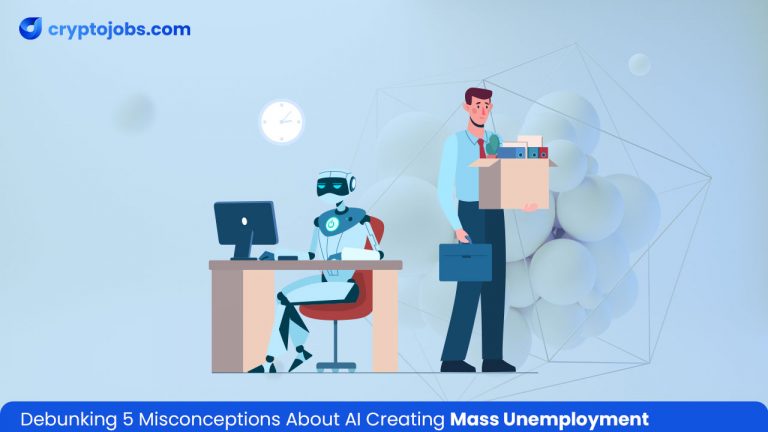
Debunking 5 Misconceptions About AI Creating Mass Unemployment
- cryptojobs.com
- March 15, 2024
- All Posts, Career Guide
- 0 Comments
Artificial Intelligence (AI) is a major technological advancement of the 21st century. The buzzword has now become a reality with machines performing with a near human intellect. The goal of AI is to create machines that can think like us. A successful demonstration was the reigning world champion Garry Kasparov’s defeat against an AI machine in a game of chess. More recently, we have witnessed AI-enabled virtual assistants, chatbots, and generative tools that are automating and facilitating various operations.
All this raises a question of AI’s impact on the job market. Some fear that AI will lead to mass unemployment, while others believe it will create new opportunities. In this article, we are debunking the five misconceptions about AI creating mass unemployment. If you belong to the former category this post will open your eyes to the other side of the picture. Let’s have a look!
Misconception 1: AI Will Replace All Jobs
The biggest misconception about AI is that it will take over all human tasks, leaving them unemployed. This misconception has arisen because people fear its potential. AI is extremely creative with extraordinary problem-solving capabilities. For example, Klarna, a financial services firm, announced that its AI-powered customer service agent is doing the job of 700 full-time agents.
But it is only effective for very specific types of tasks. Referring to our first example, the machine that beat Kasparov is only good for playing chess. Kasparov, on the other hand, can accomplish many other tasks.
Similarly, the robots working in the manufacturing industry or medical surgeries are only good at their specific tasks. They cannot handle the versatile conduct required to replace an entire occupation. This specificity in AI’s design makes it useful for certain tasks. It cannot read between the lines as we humans can.
Misconception 2: AI Will Only Benefit Employers, Not Workers
This is another popular misconception about AI. No, AI technologies are not leaving workers behind. It is designed to streamline tasks so that employers and employees are both facilitated. The ultimate goal is to make a business more profitable. Here are some ways AI is benefiting workers:
- It has taken over boring and repetitive tasks so that employees can focus on more meaningful and creative work.
- It has streamlined various tasks so that the workers become more efficient and productive at their jobs.
- The Web3 industry has created new opportunities so workers can develop new skills and take on higher-paying roles.
AI is also a great source for acquiring new skills. Many employers are using it to provide training and skill development facilities to their employees.
Misconception 3: AI Will Only Benefit Tech Industries
Another popular belief about AI is that it can only benefit technology-focused industries. It couldn’t be more wrong. AI’s abilities extend far beyond software development and data analysis. It is revolutionizing traditional practices across all industries.
Going back to our initial example, a game of chess is hardly technical, yet the machines excelled at it. Similarly, in healthcare AI helps doctors diagnose diseases more quickly and accurately. Machine learning algorithms are trained on patient data and medical images so they can precisely identify various diseases. It improves healthcare delivery while reducing costs.
In finance, AI can conduct data analysis to detect both investment opportunities and fraud. It helps investors manage risks and make smart investment decisions.
Even in the Web3 industry, AI can help improve security and manage decentralized networks. Its extent reaches retail, transportation, legal, manufacturing, and many other sectors.
Sure, the tech industry is at the forefront of the AI revolution, it’s driving innovation and efficiency across industries. From agriculture to manufacturing, Al has the power to transform every aspect of our lives.
Misconception 4: AI Will Negatively Impact Low-Skilled Workers
This is another misconception brought on by the fear of AI taking over jobs. Yes, AI adoption is closing some jobs, but it is also altering their types. Many businesses have shifted to AI for mundane and repetitive tasks. This leaves them to use their time, resources, and workforce on tasks that require complete human skills.
For instance, in the Web3 industry, AI can enhance the efficiency of tasks such as content creation and customer support. But it cannot entirely replace the empathy or insight that only a true human mind can bring.
That said, businesses still need employees to oversee the digital workers i.e. AI-powered machines. A machine learning algorithm, for example, needs a human to train it. Only with human intervention can it perform flawlessly.
The low-skilled workers can use AI to their benefit by automating repetitive tasks. They can also use it to upskill themselves and take on more creative and rewarding jobs.
Yes, AI is changing the job market. But it is not all bad news for low-skilled workers. It also provides them the opportunity to streamline their tasks and to learn new skills that will get them new, better jobs.
Misconception 5: Implementing AI will be a Huge Expense
Many people believe that integrating AI solutions into everyday businesses will be a huge expense. It is not. AI technologies are becoming accessible and affordable with each passing day.
The AI tools and platforms available today cater to the demands of businesses of all sizes. They also offer flexible pricing options so companies can choose a plan that suits their financial situation. Some even offer pay-as-you-go subscriptions so businesses can scale their AI initiatives as their needs and resources expand.
So, incorporating AI into business operations will not require a significant financial investment. It is attainable for small businesses and startups too.
People also forget that the potential return on investment (ROI) of implementing AI far outweighs its initial costs. It has the ability to cut costs. At Klarna, it has replaced 700 customer service agents reducing the overall cost of the department. The financial service can now use this workforce to draft innovative financial solutions that can bring even more revenue to the company.
Similarly, in HR processes, AI is streamlining the recruitment process. The AI-driven tools facilitate screening by analyzing applications to find the most suitable candidates. They can sometimes set up initial interviews too. This has shortened the overall recruitment time and has freed up time, resources, and efforts that would otherwise have gone into making a single hire.
Parting Thoughts
The bottom line of this entire discussion is that AI will not create mass unemployment. Yes, it is taking on some jobs, but the new ones it is creating are more in number. It is like the Industrial Revolution when floor workers were replaced by machines. But it didn’t result in floor workers going out of jobs. They embraced the new technology and took on new roles that brought them better compensation. Even if you are a small business owner, you shouldn’t shy away from AI solutions. They will bring in more revenue than the initial cost you will pay for acquiring them.
Finding Web3 jobs in the competitive web3 space can be stress-free with cryptojobs.com, as top Web3 and crypto companies trust the platform for hiring the best talent. Start your job search today and find a position that matches your skillset.




